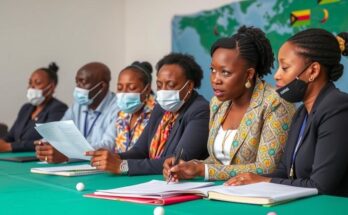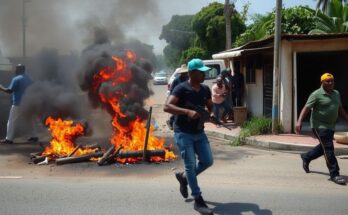Mozambique’s upcoming presidential election on Wednesday will determine new leadership as the country continues to confront a decades-long Islamic State-linked insurgency. While Frelimo’s candidate, Daniel Francisco Chapo, is the favorite, discontent among the youth may challenge traditional political norms. The election will serve as a critical reflection of Mozambique’s democracy and the waning influence of historical liberation movements in southern Africa.
Voters in Mozambique are set to cast their ballots for a new president on Wednesday, amidst an ongoing battle against a persistent insurgency linked to the Islamic State, which has plagued the country for several years. This election will be pivotal as it emerges against a backdrop of significant humanitarian and economic challenges exacerbated by the conflict, particularly in the northern Cabo Delgado province. Although the insurgency’s strength has diminished since the outbreak of violence in 2017, the situation remains unstable, and the implications of this electoral process extend beyond Mozambique’s borders as the world observes the government’s efforts to combat extremism. Daniel Francisco Chapo, representing the ruling party Frelimo, is widely expected to secure victory against his three opponents, marking a notable transition in Mozambique’s leadership. Should he win, he will be the first president born after the country’s independence from Portugal in 1975, symbolizing a generational shift. Conversely, there is an independent candidate who has garnered significant support from the youth, creating a potentially unpredictable dynamic in this election. This electoral event not only tests Mozambique’s democratic framework but also reflects the declining popularity of southern Africa’s historical liberation movements, as young citizens demand accountability from their leaders who have not fulfilled their post-independence promises.
The context of Mozambique’s 2024 national elections is crucial to understanding the broader implications for the nation and the region. The country has been grappling with a violent insurgency since 2017, primarily in Cabo Delgado, where militants have committed severe atrocities that have wrought humanitarian distress and economic hardship. The persistence of these issues has created a climate of discontent among the populace, especially within the younger demographic who feel neglected and unrepresented. Furthermore, the election represents an opportunity for the electorate to reassess the leadership of the Frelimo party, which has dominated Mozambique’s political landscape since independence. The combination of internal challenges and the involvement of independent candidates could reshape the country’s future and influence the regional stability of southern Africa.
In conclusion, the 2024 national elections in Mozambique are poised to be a defining moment for the country, potentially signaling a shift in leadership and the political landscape. With significant challenges such as the ongoing insurgency and the evolving demands of a disillusioned youth, the outcome of this election could have far-reaching consequences for Mozambique and beyond. As the electorate navigates these complexities, it remains to be seen how they will respond to the longstanding political establishment represented by Frelimo in comparison to the hopes for change embodied by independent candidates.
Original Source: www.nytimes.com



